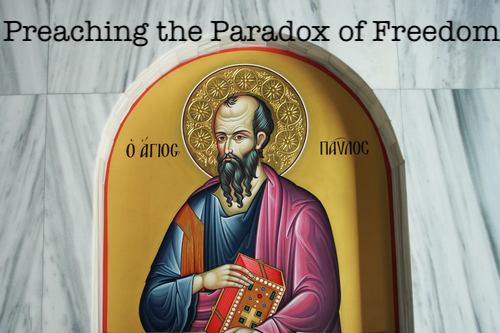 It’s just who I am. I remember my time at an Evangelical Protestant school for my undergraduate degree, and the 2 years of homiletical (how to give a sermon). It was a bit grueling and my professor was particularly tough on me. One day, I was walking with another seminarian and he overheard our conversation. He stopped me and said, “Brother Powell, you are a preaching machine!” I chose to take that as a compliment. I love doing it, and I hope it shows.
It’s just who I am. I remember my time at an Evangelical Protestant school for my undergraduate degree, and the 2 years of homiletical (how to give a sermon). It was a bit grueling and my professor was particularly tough on me. One day, I was walking with another seminarian and he overheard our conversation. He stopped me and said, “Brother Powell, you are a preaching machine!” I chose to take that as a compliment. I love doing it, and I hope it shows.
The truth is I do love to preach. It is a particular interest of mine because the scriptures declare “How will they hear without a preacher?” Preaching is as much a part of our liturgical life in the liturgy as all the other aspects of the liturgy. It is integral to preparing one’s heart to receive the Eucharist. That’s why the homily traditionally comes directly after the Gospel Lesson in the Divine Liturgy. This is another tool in the liturgical life of the Church to properly prepare you for receiving the Eucharist.
Look at our lesson today in 1 Corinthians 9:13-18:
BRETHREN, do you not know that those who are employed in the temple service get their food from the temple, and those who serve at the altar share in the sacrificial offerings? In the same way, the Lord commanded that those who proclaim the gospel should get their living by the gospel. But I have made no use of any of these rights, nor am I writing this to secure any provision. For I would rather die than have any one deprive me of my ground for boasting. For necessity is laid upon me. Woe to me if I do not preach the gospel! For if I do this of my own will, I have a reward; but if not of my own will, I am entrusted with a commission. What then is my reward? Just this: that in my preaching I may make the gospel free of charge, not making full use of my right in the gospel.
St. Paul is continuing the straightforward “spiritual medicine” he gives the Corinthians to move them forward in their spiritual lives. Notice what he says here today about preaching and his own ministry. The Church in Corinth was filled with “colorful” people! It was a very gifted and vibrant community, but that had good aspects and not-so-good aspects. One of the bad aspects was that some very talented people in the parish thought too highly of themselves and felt they deserved recognition for their “rights.”
Just a little background will be helpful. First, St. Paul was a tentmaker by trade. In his missionary work through the Roman Empire, he paid for his ministry himself so that these young parishes could get off the ground. Now notice, he doesn’t say his way was the best way or even the proper way. In fact, he reminds his readers that the normal and rightful way to support the ministers of the Temple was to have them “get their food from the temple.” In other words, the right thing for the people to do is to take care of their ministers.
But look what St. Paul says. He declares that he has chosen to not insist on this “right” so that there would be no hindrance to the message of Christ. He adds that a necessity has been laid on him. He MUST preach the Gospel because he has been commissioned to do this. And, even though he could insist on being supported by his ministry, he exercises his freedom to not be so that there is no barrier to anyone in receiving his message. Why would Paul feel so strongly about this? Precisely because he understood that he was first a debtor to the grace of God. God had freely given him the Good News, even though it did cost Paul his previous reputation in the Jewish faith. Even though it did deprive Paul of his physical eyesight for a short time. Even though it did cost Paul time in prison, beatings, rejections, and persecution, St. Paul knew that he was a debtor to God’s grace. So, out of his freedom, he makes himself a slave to love by declaring the message of Christ and not insisting on his “rights.”
St. Paul leaves us with a powerful example of what it means to give FROM gratitude and not TO need. His example shows that gratitude is driven, not by external circumstances, but internal character. This liberty from the false notion of “rights” and demands sets us free to practice the truly Christian virtue of generosity expecting nothing in return!
Sts Boris and Gleb, the Passion-bearers, were sons of St. Prince Vladimir, the renowned leader of the Slavic people who converted them to Orthodoxy. These two sons of Prince Vladimir were pious young men who truly embraced the Faith. Sadly, in 1015 AD they were both killed by their brother Svyatopolk. There was a dispute over who should succeed Vladimir in the kingdom, and these two brothers decided they would not resist their brother Svyatopolk’s claim to the throne, but he still saw them as rivals. So as to not cause civil war in their country these two brothers refused to fight back, and they were killed. This is why we call them Passion-bearers. And this is a powerful illustration of how not demanding your rights provides a greater resurrection for those who courageously “give up” their demands for more eternal rewards.
Today, do you know what it is that is necessary for your life? What motivates you toward gratitude? Is it hearing about a need or is it driven by an internal “calling?” Your faithful willingness to forgo your “rights” for the love of others is always a sign that your heart has been moved away from self-destructive selfishness and toward having a Normal Orthodox Life!
P.S. O Righteous Passion-bearers and true fulfillers of the Gospel of Christ, Chaste Boris and guileless Gleb, you did not oppose the onslaughts of your enemy, your brother, who though killing your bodies was unable to touch your souls. Let the evil lover of power mourn therefore, while you rejoice with the angelic choirs; and as you stand before the Holy Trinity, pray for the souls of them that honor your memory, that they may be pleasing to God: and by your intercessions, pray that all Orthodox people may be saved.



1 Comment
Linda Vogt Turner
I think the Blog and the comments on this Blog Post published by Father Lawrence Farley are saying the same thing! https://blogs.ancientfaith.com/nootherfoundation/the-essence-of-orthodoxy/#comments